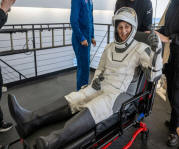Microgravity Issues
Although space exploration has reached remarkable heights, it presents significant risks and challenges, particularly for astronauts undertaking long duration missions. One of the primary concerns is the physiological impact of microgravity. Extended exposure to a weightless environment leads to muscle atrophy, bone density loss, and cardiovascular issues. To mitigate these effects, astronauts aboard the International Space Station follow rigorous exercise routines and dietary plans. The advancements in countermeasures are being developed to maintain astronaut health in space.
 Physical
Effects
Physical
Effects
-
Muscle loss
-
Bone density loss
-
Cardiovascular stress
Radiation Exposure
Radiation
exposure is another major threat to space travelers. Without Earth’s
Protective atmosphere, astronauts are exposed to cosmic radiation,
increasing the risk of cancer and neurological disorders. Researchers are
currently exploring the use of artificial magnetic fields and
radiation-resistant materials to address this issue.
Psychological Challenges